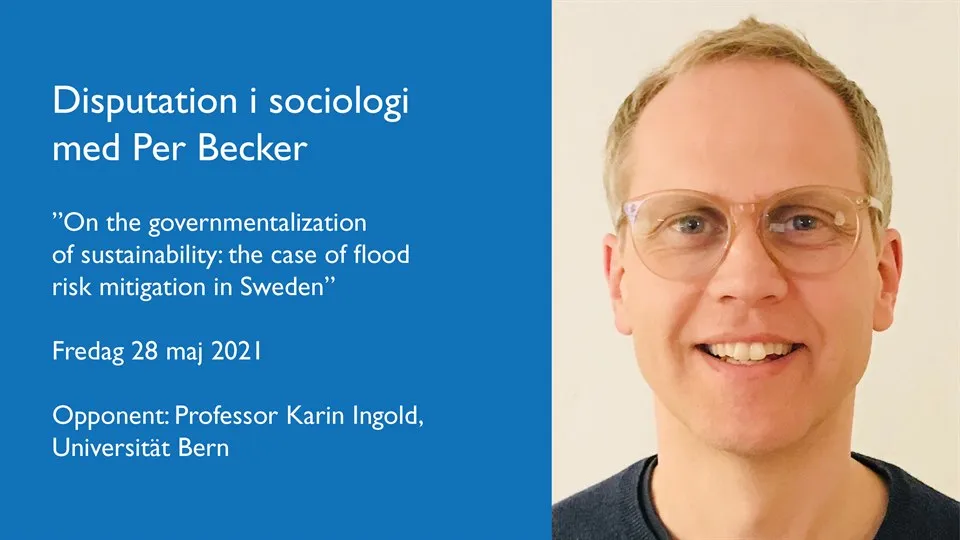Disputation i sociologi
Välkommen till Per Beckers disputation där han försvarar avhandlingen "On the governmentalization of sustainability: the case of flood risk mitigation in Sweden". Disputationen genomförs i Zoom, anmälan är obligatorisk.
Det moderna samhället har många hållbarhetsutmaningar. Trots riklig litteratur som behandlar styrningen av en rad sådana utmaningar har de processer genom vilka de blir till något styrbart på samhällsnivå inte fått mycket uppmärksamhet. Denna avhandling syftar till att öka vår förståelse för hur komplexa hållbarhetsutmaningar görs styrbara i vår typ av samhälle. Den presenterar en studie av förebyggande av översvämningsrisker i södra Sverige. Resultaten avslöjar anmärkningsvärd fragmentering i förebyggandet av översvämningsrisk, en koncentration av ansvar till kommunerna, samt ökande betydelse av marknaden i dess styrning. Resultaten identifierar även hur förebyggande av översvämningsrisk görs styrbart genom att (1) tänka på det komplexa problemet i mindre, frikopplade delar, (2) hantera problemet bitvis genom frikopplade projekt, (3) överföra ansvar till en aktör med mindre makt och utan lämpliga resurser, och (4) genom att se lösningen på problemet som en sammanläggning av olika delar som kan anskaffas på marknaden. Även om dessa processer resulterar i att allvarligt undergräva syftet med förebyggande av översvämningsrisk, visar de sig också grundläggande för att det ska kunna styras överhuvudtaget.
Opponent: Professor Karin Ingold, Universität Bern
Huvudhandledare: Professor Roine Johansson
Biträdande handledare: Docent Jörgen Sparf
Abstract
Contemporary society is confronted with numerous sustainability challenges. Some are new, others have been around since time immemorial, but none have been governed on the societal level since their emergence. Despite an abundant literature that addresses the governing of a range of such sustainability challenges, the processes through which they become something governable in the first place have not received much attention. This thesis, therefore, seeks to increase our understanding of how complex sustainability challenges become governmentalized in advanced liberal democracies. It presents an empirical investigation of the recent problematization of flood risk mitigation in a specific area. The goal is to answer two questions: (1) how flood risk mitigation is governed; and (2) how the process of governmentalization is conditioning this governing in Sweden. It combines theoretical perspectives of governmentality and new institutionalism. The case study focuses on the governing of flood risk mitigation in Lomma municipality and the Höje Å catchment area in Southern Sweden, and mixes structural and interpretative methods.
Data were collected through 217 interviews with all actors who actively contribute to flood risk mitigation in the area, together with numerous documentary sources. The findings reveal remarkable spatial, temporal, and functional fragmentation in the regime of practices mitigating flood risk, a concentration of responsibility for flood risk mitigation in municipal administrations, and an escalating penetration and diffusion of the market in its governing. Four constituent processes of governmentalization were identified. Reductivization refers to the process of conceptualizing the complex problem in smaller, disconnected parts. Projectification captures how the problem is addressed through piecemeal projects. Responsibilization is the process by which responsibility is transferred to an actor with less power and who lacks appropriate resources, and commodification refers to seeing the solution to the problem as the aggregation of standardized modules that can be sourced on the market. While these processes are intrinsically linked, and combine to seriously undermine the purpose of flood risk mitigation, they are also fundamental for it to become governable in the first place. This nexus may be a general feature of the governmentalization of complex sustainability challenges in advanced liberal democracies, albeit to various degrees and in different ways depending on the penetration and diffusion of neoliberalism.
